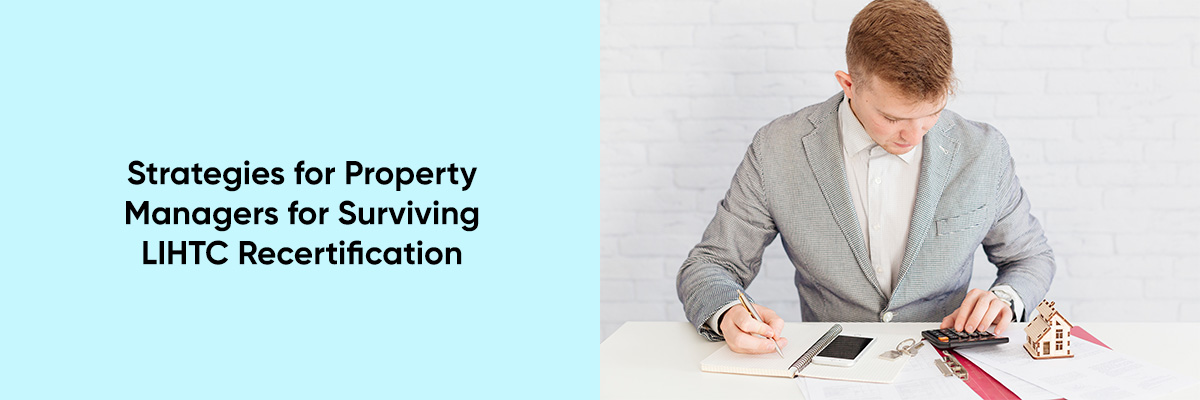The Low-Income Housing Tax Credit (LIHTC) program plays a pivotal role in promoting affordable housing, but maintaining compliance through the recertification process can be challenging for property managers. Successful recertification is critical to securing continued funding and avoiding penalties.
Here are strategic approaches to navigate the recertification process effectively.



1. Understanding Compliance Requirements
The first step in ensuring smooth LIHTC recertification is a thorough understanding of the program’s compliance requirements. Property managers must be well-versed in:
- Income and Rent Limits: Familiarize yourself with the income limits for tenants and the maximum allowable rents, which are updated annually by the Department of Housing and Urban Development (HUD).
- Qualified Allocation Plan (QAP): Each state’s QAP outlines specific requirements and priorities for LIHTC properties. Reviewing your state’s QAP will provide essential guidance on compliance.
2. Organized Record-Keeping
Maintaining meticulous records is crucial for LIHTC recertification. Implementing an organized system for documentation can prevent potential issues:
- Tenant Files: Keep detailed records of tenant applications, income verifications, lease agreements, and annual recertifications. Ensure that all documents are complete and up-to-date.
- Property Management Software: Invest in property management software designed for LIHTC properties to streamline record-keeping and reporting processes.
3. Regular Training and Education
Continuous education and training are vital for staying compliant with LIHTC requirements:
- Staff Training: Conduct regular training sessions for property management staff on LIHTC rules, income verification processes, and fair housing laws.
- Professional Development: Encourage staff to attend workshops, webinars, and conferences on LIHTC compliance to stay informed about changes in regulations and best practices.
4. Effective Tenant Communication
Open and clear communication with tenants is essential for ensuring timely and accurate recertifications:
- Annual Recertification Notices: Send out recertification notices well in advance, clearly outlining the necessary steps and required documentation.
- Assistance and Support: Provide assistance to tenants in completing the recertification process, including offering help with gathering income documentation and answering any questions they may have.
5. Internal Audits and Mock Inspections
Conducting internal audits and mock inspections can help identify and rectify potential compliance issues before the official recertification process:
- Internal Audits: Regularly review tenant files and financial records to ensure accuracy and completeness. Address any discrepancies immediately.
- Mock Inspections: Perform mock inspections to ensure that the property meets all physical standards required by LIHTC guidelines. This can help prepare for state agency inspections and minimize the risk of non-compliance.
6. Collaboration with Compliance Experts
Partnering with compliance experts can provide valuable insights and assistance in navigating the complexities of LIHTC recertification:
- Consultants: Consider hiring LIHTC compliance consultants to conduct thorough reviews of your property’s operations and provide recommendations for improvement.
- Legal Advisors: Engage legal advisors with expertise in affordable housing to ensure that your property adheres to all relevant regulations and to address any legal concerns that may arise.
7. Staying Updated on Regulatory Changes
LIHTC regulations and guidelines can change over time. Staying informed about these changes is crucial for maintaining compliance:
- Industry Associations: Join industry associations, such as the National Council of State Housing Agencies (NCSHA) and the Affordable Housing Tax Credit Coalition (AHTCC), to receive updates on regulatory changes and participate in advocacy efforts.
- Government Resources: Regularly check HUD and IRS websites for updates on income limits, rent restrictions, and other relevant guidelines.
8. Proactive Issue Resolution
Addressing potential issues proactively can prevent them from escalating into significant compliance problems:
- Regular Tenant Communication: Maintain open lines of communication with tenants to identify and address any issues early on.
- Timely Repairs and Maintenance: Ensure that all necessary repairs and maintenance are conducted promptly to meet physical inspection standards.
Conclusion
Navigating the LIHTC recertification process requires diligence, organization, and a proactive approach. By understanding compliance requirements, maintaining meticulous records, providing ongoing training, and fostering effective communication with tenants, property managers can successfully manage the complexities of LIHTC recertification. Partnering with compliance experts, staying updated on regulatory changes, and proactively addressing potential issues further ensure continued compliance and the long-term success of LIHTC properties.


